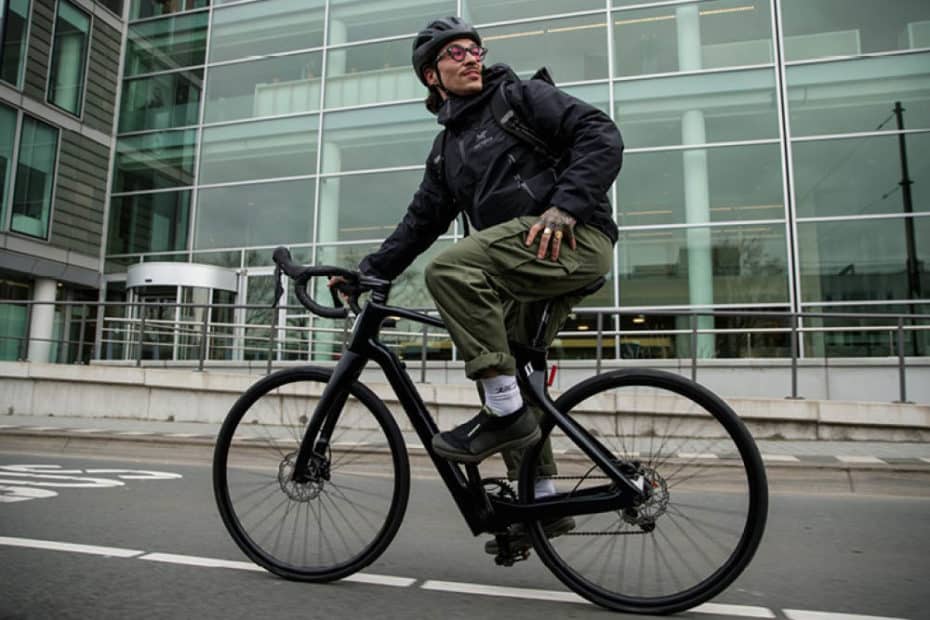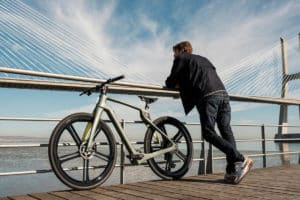For many cyclists, custom-made frames are the pinnacle of cycling. Master craftsmanship and the highest degree of precision come together in a one-off, whose literal uniqueness gives form to the quest for perfection – just as it does to the quest for the greatest possible individuality. Until now, this niche of bicycle production was almost exclusively reserved for regular bicycles without electric assistance. Now the customised ebike is moving a good deal closer to the European market.
About two and a half years ago, a US company caused a stir with a crowdfunding campaign on Indiegogo. It wanted to produce customised carbon frames for ebikes using a 3D printer. At affordable prices, too. After some growing pains, Arevo actually delivered the first models of the Superstrata to North America and Asia last year. Now the Austrian start-up Super Mobility has acquired the exclusive distribution rights for Germany, Austria, Switzerland and large parts of Europe. Company founder Richard Hirschhuber is working with Arevo to do this. To start with, he is using Arevo’s printers in Vietnam. In perspective, he plans to build up his own capacities. “We would like to have a 3D printer for bike production in every country in Europe in the next five years,” Hirschhuber recently told the industry magazine “Velobiz”.
How special is the one-off from the printer?
For this to happen, business must be really good for Super Mobility. Hirschhuber himself puts the cost of such a printer at 800,000 euros to 1.2 million euros. And it remains to be seen how big the market is for such an offer. Because unlike the individual models from the bicycle builders’ workshop, the Superstrata does not shine with polished weld seams or elaborately decorated lugs. It will be difficult to see the uniqueness of the product from the printer.
At the same time, this disadvantage is one of the greatest advantages of the business model. The frame material is available at almost any time, the frame is manufactured within a few hours and the result weighs just 1.4 kilograms. Of course, there are other components and add-on parts to add to the availability. However, at the moment, the argument that a custom-made ebike can be ridden within a few days probably convinces some interested parties.
Surprisingly little data requested
In the long run, however, the success of this project will certainly stand or fall with the question of how well the initiators succeed in convincing people of the advantages of customised production. Those who currently want to order an ebike according to their body measurements are presented with two options on the website. The shorter one only asks for body size and inseam, as well as the preferred position on the bike, which can be determined between the two poles of “relaxed” and “aggressive”. Any semi-professional bicycle shop will ask for this information when looking for the right frame size.
Option number two, the “Superfit”, is a little more sophisticated. Here you still specify the knee height, ankle height and arm length.
Some wishes already included
In general, Super Mobility uses the custom-made approach. This means that you can equip your bike according to your own wishes. At least within certain limits. It currently starts at a price of 4,299 euros for a singlespeed version. The optional derailleur with eleven gears means a surcharge of 200 euros. On the other hand, the choice between a flat handlebar and a drop bar is not reflected in the price. Things only get interesting again when you get to the colour selection. If you don’t like any of the standard colours, you’ll have to pay another 500 euros for premium paintwork. Or you can opt for the luxury finish and add 800 euros instead.
Some of the components on offer come from rather unknown manufacturers. Names like Andel Components from Taiwan or Rallex from China probably mean something to only a few of you. In some cases, no specific manufacturers are named, as in the case of the tyres.
Motor in the rear wheel
Fortunately, there is more clarity about the electric drive. It comes from the well-known Chinese manufacturer Bafang. The Superstrata has a rear-wheel hub motor with the usual 250 watts and a torque of 50 Newton metres. In this category, it even outperforms prominent drives such as the X35+ from Mahle, the HM 1.0 from FSA or the Hyena G2 from Trek. Bafang is also responsible for the rest of the ebike system – from the battery located in the down tube, to the control unit integrated on the top tube, to the 1.9-inch LCD display with its USB charging port and the sensor that automatically regulates the brightness of the screen.
To give its ambitions the necessary tailwind, Super Mobility launched a crowdfunding on the Conda platform on 5 December 2022. You can support the project financially until mid-January 2023 and participate in a possible success. The funding target is 440,000 euros. So far, just over 200,000 euros have been raised. According to Super Mobility, the money raised will be used to boost marketing and sales.
Pictures: Supermobility GmbH





